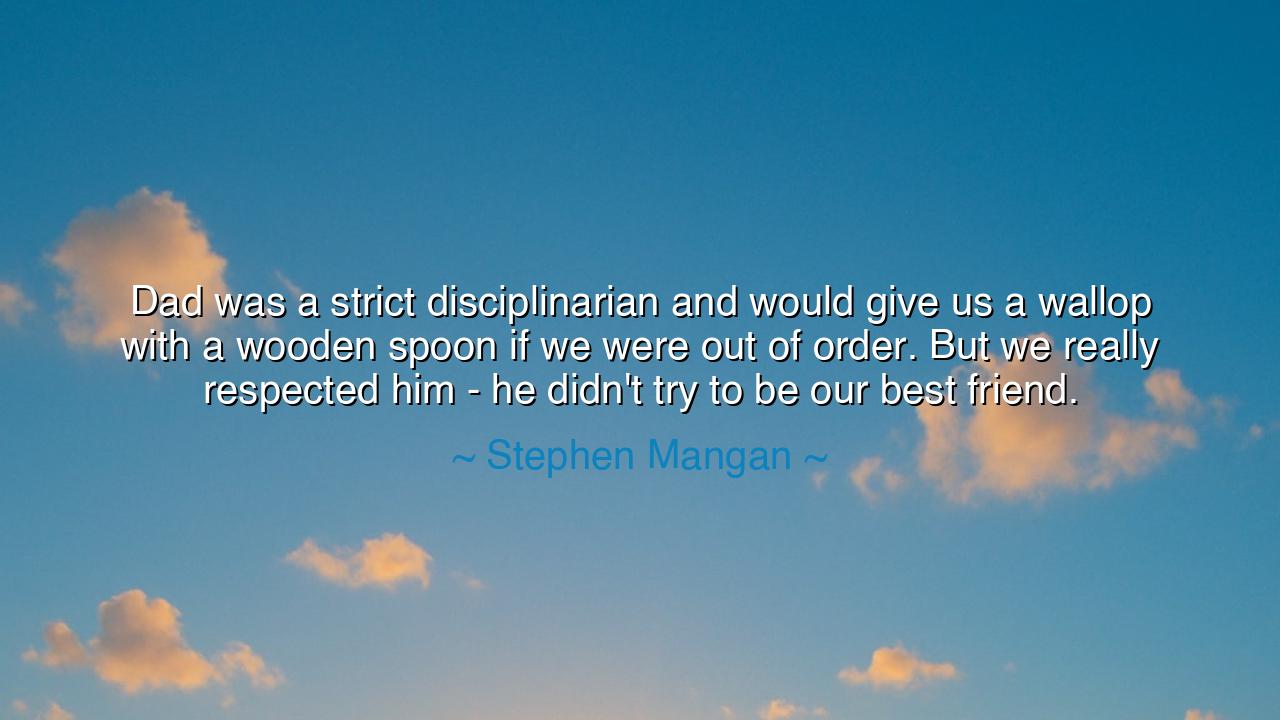
Dad was a strict disciplinarian and would give us a wallop with
Dad was a strict disciplinarian and would give us a wallop with a wooden spoon if we were out of order. But we really respected him - he didn't try to be our best friend.






In the words of Stephen Mangan: “Dad was a strict disciplinarian and would give us a wallop with a wooden spoon if we were out of order. But we really respected him – he didn’t try to be our best friend.” These words carry the weight of generations, echoing a truth that has endured since the dawn of families and the rise of civilization itself: that discipline, when tempered with love, builds character more enduring than stone, and respect more lasting than fleeting affection.
The ancients knew well that the father was not merely a companion to his children, but a guardian, a guide, and a sculptor of the soul. A parent who seeks to be only a friend, offering softness without firmness, risks leaving their children untutored in the ways of life’s hardships. Just as the oak grows tall because it resists the wind, so too do sons and daughters grow strong when tested by boundaries and discipline. Mangan’s memory of the wooden spoon is less a tale of pain than of structure, less about punishment than about learning the gravity of order.
Consider the tale of Spartan fathers, who did not coddle their sons but entrusted them to rigorous training, preparing them not for comfort but for endurance. Harsh though it seemed, this discipline created warriors whose courage still shines across history’s scroll. They were not pampered; they were strengthened. And though the methods of today differ, the principle remains: respect blossoms not from indulgence, but from the wisdom of correction and the authority of a guiding hand.
Yet let us not mistake severity for cruelty. The father Mangan remembers was not a tyrant, but one who “did not try to be our best friend.” His strength lay not in seeking approval but in holding true to his role as protector and mentor. True friendship between parent and child can only bloom after respect has first taken root. A house without discipline is like a ship without a rudder, drifting aimlessly on seas that show no mercy.
The Roman philosopher Seneca once wrote that the man who spares his child all difficulty condemns him to weakness. And so it is with families: when parents shield their children from every discomfort, they do not prepare them for life’s inevitable trials. It is in the measured wallop, in the stern correction, in the boundaries firmly held, that children learn resilience and discernment. Through these trials, they come to honor their parents not as companions of convenience, but as pillars of wisdom.
And we, who inherit these lessons, must carry them forward. In our age, there is a temptation to blur the sacred line between parent and peer, to give children not what they need but only what they desire. Yet the ancient voice calls us to rise above this softness. Discipline does not destroy love; it shapes it. Respect does not grow from indulgence, but from guidance.
So let the lesson be clear: to love is to guide, to discipline is to prepare, and to be respected is greater than to be liked. In your own life, if you are a parent, set boundaries with firmness, but always with compassion. If you are a child, honor those who shaped you, even if their methods seemed hard, for they forged you for the storms of life. And if you are neither, still remember: in every bond of love, respect is the root that gives strength, while friendship is the flower that blooms only when the root is strong.
Therefore, act with courage. Do not be afraid to say “no” when wisdom demands it. Do not yield authority for the fleeting comfort of being liked. Build respect first, and friendship will follow as a harvest in due season. For as Stephen Mangan’s words remind us, discipline remembered is not bitterness—it is gratitude, sung across the years.






AAdministratorAdministrator
Welcome, honored guests. Please leave a comment, we will respond soon